- Home
- Gregory Maguire
Wicked: The Life and Times of the Wicked Witch of the West Page 44
Wicked: The Life and Times of the Wicked Witch of the West Read online
Page 44
“Not Yackle,” said the Witch. She dropped her drink. “This is insanity, my ears are having delusions. Everyone is right, I’m paranoid. No, Avaric, I refuse to admit you could remember someone’s name for twenty years like that.”
“She was a balding gypsy woman with a wig, and sort of chestnut-colored eyes, in thick with this dwarf. I don’t know what he was called. Why shouldn’t I remember it?”
“You didn’t remember my name.”
“You didn’t scare me half as much. In fact you never scared me.” He laughed. “I was probably pretty nasty to you. I was an asshole back then.”
“You still are.”
“Well, practice makes perfect, and more than once I’ve been called a perfect asshole.”
“I came by to tell you that I killed Madame Morrible today,” said the Witch. She was so proud of the phrase; it seemed less false when said aloud. Maybe it was true. “I killed her. I wanted someone who would be believed to know about it.”
“Oh, why ever did you do that?”
“You know, the reasons just reassemble themselves in different patterns every time I think about it.” She sat up a little straighter. “Because she deserved it.”
“The Avenging Angel of Justice is now green?”
“A pretty good disguise, don’t you think?” They both grinned.
“So about this Madame Morrible, whom you claim to have killed? Did you know that she gathered your friends and associates together and gave us a little lecture after you’d run away?”
“You were never my friend.”
“I was too near to be excused. I remember the situation. Nessarose was mortified and shattered by the whole thing. Madame Morrible took out your records and read to us a profile of your character as assessed by your various teachers. We were warned about your spikiness, your fringiness, what were the words they used? I can’t remember that, they weren’t memorable words. But we were told you might try to recruit us in some sort of juvenile attempt to galvanize some sort of student uprising. You were to be avoided at all costs.”
“And Nessarose was mortified, well, that figures,” said the Witch grimly.
“Glinda too,” said Avaric. “She went through another slide, like the one she went into after Doctor Dillamond fell on his magnifying lens—”
“Oh please, is that hoary old lie still in circulation?”
“—oh all right, was brutally murdered by brigands unknown, have it your way. Brigands in the form of Madame Morrible, that’s what you mean me to suppose. So why really did you do it?”
“Madame Morrible had a choice. No one was better placed than she to see that her students got an education and not a brainwashing. By hooking up with the Emerald City, she sold out all her students who believed that a liberal education meant learning to think for themselves. Besides, she was a vile fiend, and she did conspire to have Doctor Dillamond murdered. No matter what you say.”
But the Witch stopped herself short, hearing in her words about Madame Morrible—she had a choice—an echo of what the Elephant Princess Nastoya had once said to her: No one controls your destiny. Even at the very worst—there is always choice.
Avaric was rattling on. “And you’ve had her murdered. Two wrongs don’t make a right, as we boys used to chant on the playground, usually when we were on the ground with someone’s knee on our groin. Why don’t you stay for a meal? We’ve got guests, a clever bunch.”
“So you can call the police? No thanks.”
“I won’t call the police. You and I, we’re above petulant justice like that.”
The Witch believed him. “All right,” she said. “Who are you married to, by the way? Did you get married to Pfannee, or Shenshen, or someone else? I can’t remember.”
“Whoever,” said Avaric, pouring another finger of whiskey. “I can’t keep small details in my mind, never could.”
The Margreave’s pantry was fulsome, his cook a genius, and his wine cellar unparalleled. The guests tucked into snails and garlic, roast crest of fallowhen with cilantro and clementine chutney, and the Witch allowed herself a sumptuous helping of lime tart with saffron cream. The crystal goblets were never empty. The conversation was exalted and loopy, and by the time the Margreavess led them to the comfortable chairs in the drawing room, the plaster appliqué on the ceiling seemed to swirl like the cigarette smoke.
“Why, you’re flushed,” said Avaric. “You ought to have been a tippler all along, Elphaba.”
“I’m not sure red wine agrees with me,” she said.
“You’re in no condition to go anywhere. The maid will do up one of the corner rooms. It’s lovely, there’s a view clear to the pagoda on the island.”
“I don’t care for prepared views.”
“Don’t you want to wait for the morning papers, to see if they got it right? If they got it at all?”
“I’ll ask you to send me one. No, I must go, I feel the need of some fresh air. Avaric—Madame—friends—it’s been a surprise and I suppose a pleasure.” But she felt grudging as she said it.
“A pleasure to some,” said the Margreavess, who hadn’t approved of the conversation. “I think it improper to talk about evil all during a meal. It spoils the digestion.”
“Oh, but come,” the Witch said, “is it only in youth that we can have the nerve to ask ourselves such serious questions?”
“Well, I stick with my suggestion,” said Avaric. “Evil isn’t doing bad things, it’s feeling bad about them afterward. There’s no absolute value to behavior. First of all—”
“Institutional inertia,” claimed the Witch. “But whatever is the great attraction of absolute power anyway?”
“That’s why I say it’s merely an affliction of the psyche, like vanity or greed,” said a copper magnate. “And we all know vanity and greed can produce some pretty astounding results in human affairs, not all of them reprehensible.”
“It’s an absence of good, that’s all,” said his paramour, an agony aunt for the Shiz Informer. “The nature of the world is to be calm, and enhance and support life, and evil is an absence of the inclination of matter to be at peace.”
“Pigspittle,” said Avaric. “Evil is an early or primitive stage of moral development. All children are fiends by nature. The criminals among us are only those who didn’t progress . . .”
“I think it’s a presence, not an absence,” said an artist. “Evil’s
an incarnated character, an incubus or a succubus. It’s an other. It’s not us.”
“Not even me?” said the Witch, playing the part more vigorously than she expected. “A self-confessed murderer?”
“Oh go on with you,” said the artist, “we all of us show ourselves in our best light. That’s just normal vanity.”
“Evil isn’t a thing, it’s not a person, it’s an attribute like beauty . . .”
“It’s a power, like wind . . .”
“It’s an infection . . .”
“It’s metaphysical, essentially: the corruptibility of creation—”
“Blame it on the Unnamed God, then.”
“But did the Unnamed God create evil intentionally, or was it just a mistake in creation?”
“It’s not of air and eternity, evil isn’t; it’s of earth; it’s physical, a disjointedness between our bodies and our souls. Evil is inanely corporeal, humans causing one another pain, no more no less—”
“I like pain, if I’m wearing calfskin chaps and have my wrists tied behind me—”
“No, you’re all wrong, our childhood religion had it right: Evil is moral at its heart—the selection of vice over virtue; you can pretend not to know, you can rationalize, but you know it in your conscience—”
“Evil is an act, not an appetite. How many haven’t wanted to slash the throat of some boor across the dining room table? Present company excepted of course. Everyone has the appetite. If you give in to it, it, that act is evil. The appetite is normal.”
“Oh no, evil is repressing that appetite. I ne
ver repress any appetite.”
“I won’t have this talk in my drawing room,” said the Margreavess, near tears. “You’ve been behaving all night as if an old woman hadn’t been slaughtered in her bedclothes. Didn’t she have a mother too? Didn’t she have a soul?”
Avaric yawned and said, “You’re so tender and naive. When it’s not embarrassing it’s quite appealing.”
The Witch stood up, sat down quickly, and stood up again, aided by her broom.
“Why did you do it?” asked the hostess with spirit.
The Witch shrugged. “For fun? Maybe evil is an art form.”
But as she wobbled toward the door, she said, “You know, you’re all a pack of fools. You ought to have turned me in instead of entertaining me all evening.”
“You entertained us,” said Avaric broadly, gallantly. “This’ll end up being the dinner party of the season. Even if you’ve been lying all evening about killing this old schoolmarm. What a treat.” The dinner guests drolly applauded her.
“The real thing about evil,” said the Witch at the doorway, “isn’t any of what you said. You figure out one side of it—the human side, say—and the eternal side goes into shadow. Or vice versa. It’s like the old saw: What does a dragon in its shell look like? Well no one can ever tell, for as soon as you break the shell to see, the dragon is no longer in its shell. The real disaster of this inquiry is that it is the nature of evil to be secret.”
8
The moon was up again, a little less swollen than the night before. The Witch didn’t trust herself to ride on the broom, so she meandered in a zigzaggy way across the greensward. She would find a place to nap outside of the claustrophobia of a society den.
She came upon the construction that Avaric had talked about. It was an old, early tiktok thing, a sort of portable stupa made of carved wood and figurines, too variegated and numerous for the Witch to comprehend tonight. Perhaps there was a running board where she could rest underneath, a platform elevated just a couple of inches off the dampish ground. She peered, and moved forward.
“And where do you think you’re going?”
A Munchkinlander, no, a dwarf, stood in her way. He had a cudgel in one hand, and was thwacking it into the thick leathery palm of his other hand.
“Going to sleep, when I can,” she said. “So you’re the dwarf, and this is the thing Avaric talked about.”
“The Clock of the Time Dragon,” he said, “open for business tomorrow night, and not until.”
“I’ll be dead and gone by tomorrow night,” she said.
“No you won’t,” he answered.
“Well, gone anyway.” She looked at it and straightened up, then something came back to her. “I wonder how you knew Yackle,” she said.
“Oh, Yackle,” he said. “Who doesn’t know Yackle? Not such a surprise.”
“Was she killed today?” said the Witch. “By any chance?”
“No chance,” he answered.
“Who are you?” She was afraid, suddenly, after all this headiness of sorrow and violence.
“Oh, the least significant little one,” he said.
“Who do you work for?”
“Who haven’t I worked for?” said the dwarf. “The devil is a very big angel, but a very little man. But I have no name in this world, so don’t bother with me.”
“I’m drunk and disorderly,” she said, “and I cannot take any more riddles. I killed someone today, I can kill you too.”
“You didn’t kill her, she was already dead,” said the dwarf calmly. “And you can’t kill me, for I’m immortal. But you try very hard at life, and so I will tell you this. I am the guardian of the book, and I was brought to this dreaded, forsaken land to watch over the book’s history, to keep it from getting back to where it comes from. I am not good, I am not bad; but I am locked here, condemned to a deathless life to guard the book. I don’t care what happens to you or anyone else, but I protect the book: that is my charge.”
“The book?” She was struggling to understand; she felt drunker the more she heard.
“What you call the Grimmerie. It has other names—no matter.”
“Then why don’t you take it, why don’t you have it?”
“I don’t work like that. I am the silent partner. I work through events, I live on the sidelines, I dabble in causes and effects, I watch how the misbegotten creatures of this world live their lives. I interfere only to keep the book safe. To some extent I can see what’s coming, and to that extent I meddle in the affairs of men and beasts.” He jigged like a little fiend. “You see me here, you see me there. Having second sight is a great advantage in the security business.”
“You work with Yackle.”
“We sometimes have the same intentions, and we sometimes do not. Her interest seems to be different from mine.”
“Who is she? What is her interest? Why do you hover at the edges of my life?”
“In the world I come from, there are guardian angels,” said the dwarf, “but so far as I can work it out, she is an opposite number, and her concern is you.”
“Why do I deserve such a fiend? Why is my life so plagued? Who positioned her to influence my life?”
“There are things I don’t know, and things I do,” said the dwarf. “Who Yackle answers to, if anyone, if anything, is beyond my realm of knowledge or interest. But why you? You must know this. For you”—the dwarf spoke in a bright, offhand tone—“are neither this nor that—or shall I say both this and that? Both of Oz and of the other world. Your old Frex always was wrong; you were never a punishment for his crimes. You are a half-breed, you are a new breed, you are a grafted limb, you are a dangerous anomaly. Always you were drawn to the composite creatures, the broken and reassembled, for that is what you are. Can you be so dull that you have not figured this out?”
“Show me something,” she said. “I do not know what you mean. Show me something the world hasn’t shown me yet.”
“For you, a pleasure.” He disappeared, and there was the sound of mechanical parts being wound up, moving against one another, the grind of lubricated gears, the slap of leather belts, the chuck-chuck of pendulums swinging. “A private audience with the Time Dragon itself.”
At the top, a beast prowled, flexing its wings in a dance of gestures, both bidding welcome and holding at bay. The Witch stared.
A small area halfway up was illuminated. “A three-act play,” came the voice of the dwarf, from deep within. “Act One: The Birth of Holiness.”
Later she could not have said how she knew what it was, but what she saw, in an abbreviated pantomime, was the life of Saint Aelphaba. The good woman, the mystic and recluse, who disappeared to pray behind a waterfall. The Witch flinched to see the saint walk straight through the waterfall (a guttering spout overhead drained real water out into a hidden tray below). She waited for the tiktok saint to come out, but she didn’t come, and eventually the lights went out.
“Act Two: The Birth of Evil.”
“Wait, the Saint didn’t emerge as the tales say she did,” said the Witch. “I want my money’s worth or not at all, please.”
“Act Two: The Birth of Evil.”
Lights came up on another little stage. There was a credible likeness of Colwen Grounds painted on a cardboard backdrop beyond. A figurine who was Melena kissed her parents good-bye and went off with Frex, a handsome little puppet with a short black beard and a jaunty step. They stopped in a small hut, and Frex kissed her and continued on to preach. All through the rest of the scene he was off to one side, yammering away to some peasants who were busy screwing each other on the ground before him, hacking each other to pieces and eating their sexual parts, which ran with a real gravy; you could smell the garlic and sauteed mushrooms. Melena, at home, yawned and waited, and teased her pretty hair. Along came a man whom the Witch could not identify at first. He had a small black bag and from it he extracted a green glass bottle. He gave it to Melena to drink, and when she had, she fell into his arms, either stupe
fied and drunk as the Witch was tonight, or liberated. It wasn’t clear. The traveler and Melena made love in the same bouncy rhythm as Frex’s parishioners. Frex started to dance to the rhythm himself. Then, when the act of love was done, the traveler pulled himself off Melena. He snapped his fingers, and a balloon with a basket beneath descended from the fly space above. The traveler got in. It was the Wizard.
“Oh, nonsense,” said the Witch. “This is pure poppycock.”
The lights dimmed. The voice of the dwarf sounded from inside the contraption. “Act Three,” he said. “The Marriage of the Sacred and the Wicked.”
She waited, but no area was illuminated, no puppet moved.
“Well?” she said.
“Well what?” he answered.
“Where’s the end of the play?”
He stuck his head out of a trap door and winked at her. “Who said the end was written yet?” he answered, and slammed the door shut. Another door opened, just by the Witch’s hand, and a tray slid out. Lying on it was an oval looking glass, cracked along one side, scratched on its surfaces. It looked like the glass she had had since childhood, the one she used to imagine she could see the Other Land in, back when she believed in such a thing. The last she remembered of the oval glass was in her hideaway digs in the Emerald City. Inside the glass lived reflections of a young and beautiful Fiyero, and a young and impassioned Fae. The Witch took the mirror and hid it in her apron, and wandered away.
There was nothing in the morning papers about the death of Madame Morrible. The Witch, with a treacherous headache, decided that she could wait no longer. Either Avaric and his beastly companions would spread the rumors, or they wouldn’t. There was nothing left to be done.
Just let word get to the Wizard, though, said the Witch to herself. I would like to be a fly on the wall of his bunker when that happens. Let him think I killed her. Let that be how the news goes.
9
She returned to Munchkinland in a punishing journey, exhausting herself. She had slept so little, and her head still throbbed. But she was proud of herself. She arrived in the front yard of Boq’s cottage, and called for the family to come.

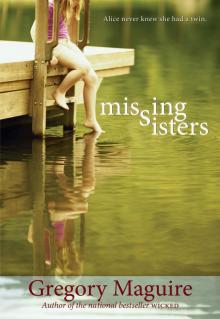 Missing Sisters
Missing Sisters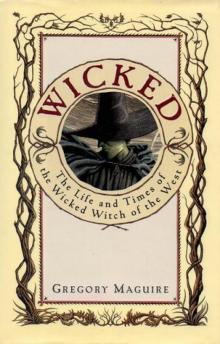 Wicked: The Life and Times of the Wicked Witch of the West
Wicked: The Life and Times of the Wicked Witch of the West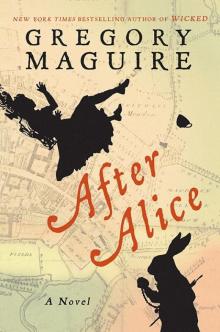 After Alice
After Alice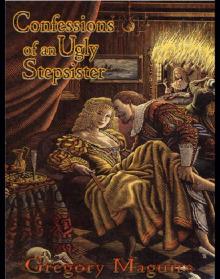 Confessions of an Ugly Stepsister
Confessions of an Ugly Stepsister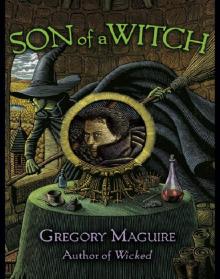 Son of a Witch
Son of a Witch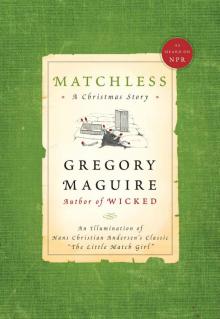 Matchless
Matchless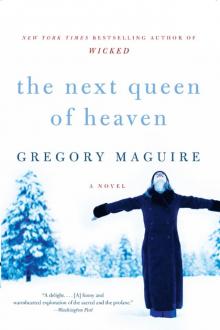 The Next Queen of Heaven
The Next Queen of Heaven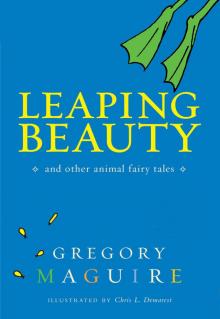 Leaping Beauty: And Other Animal Fairy Tales
Leaping Beauty: And Other Animal Fairy Tales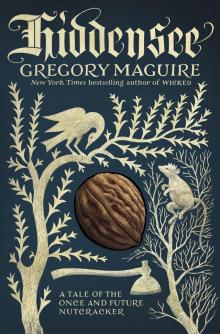 Hiddensee: A Tale of the Once and Future Nutcracker
Hiddensee: A Tale of the Once and Future Nutcracker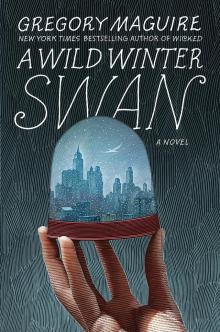 A Wild Winter Swan
A Wild Winter Swan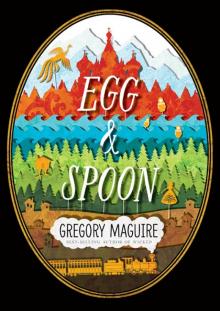 Egg & Spoon
Egg & Spoon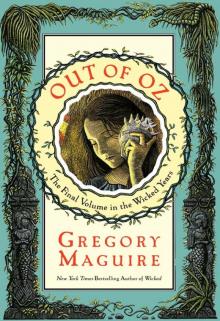 Out of Oz
Out of Oz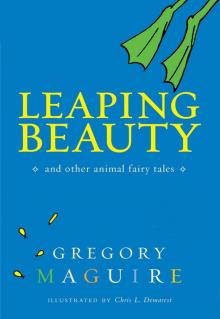 Leaping Beauty
Leaping Beauty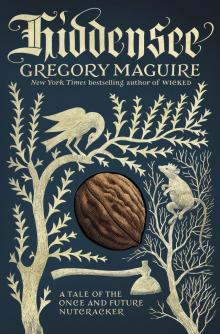 Hiddensee
Hiddensee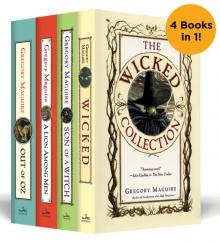 The Wicked Years Complete Collection
The Wicked Years Complete Collection The Next Queen of Heaven: A Novel
The Next Queen of Heaven: A Novel